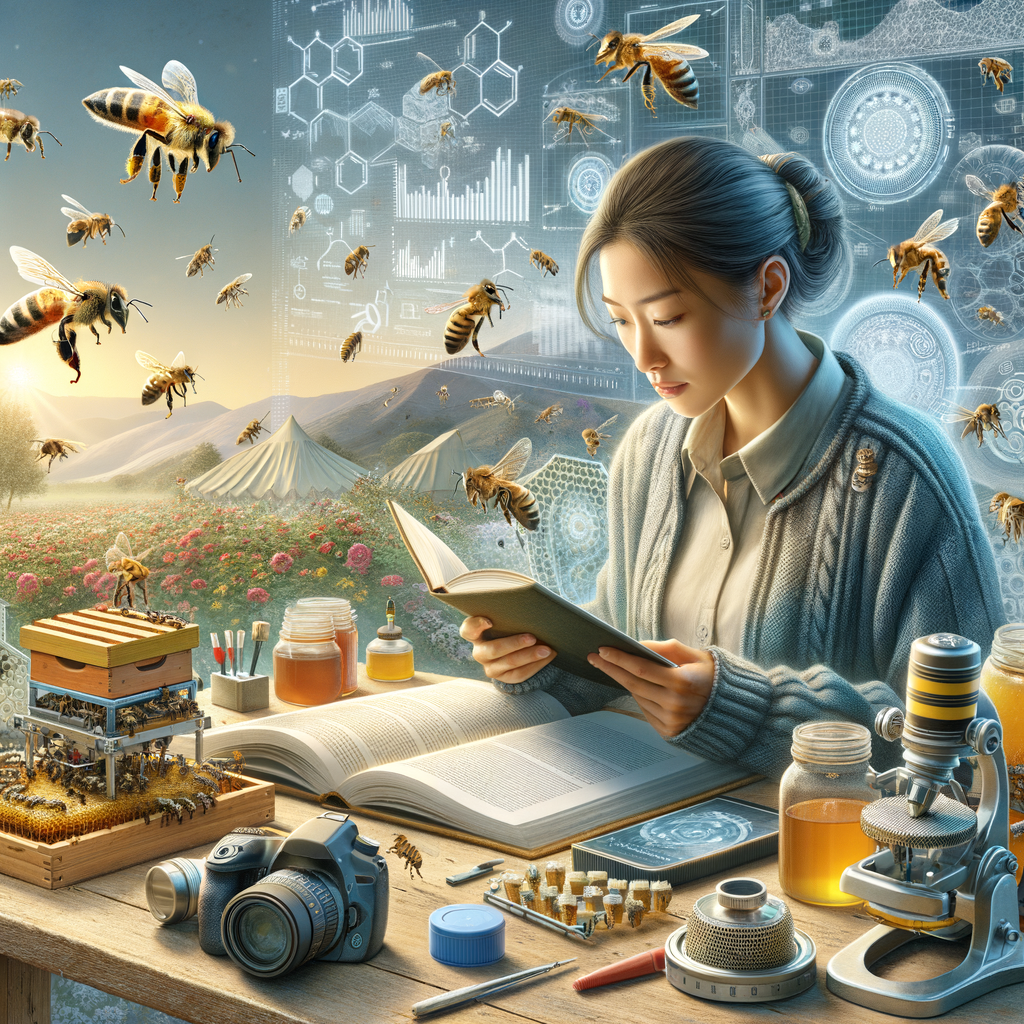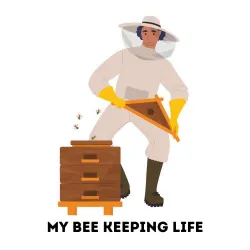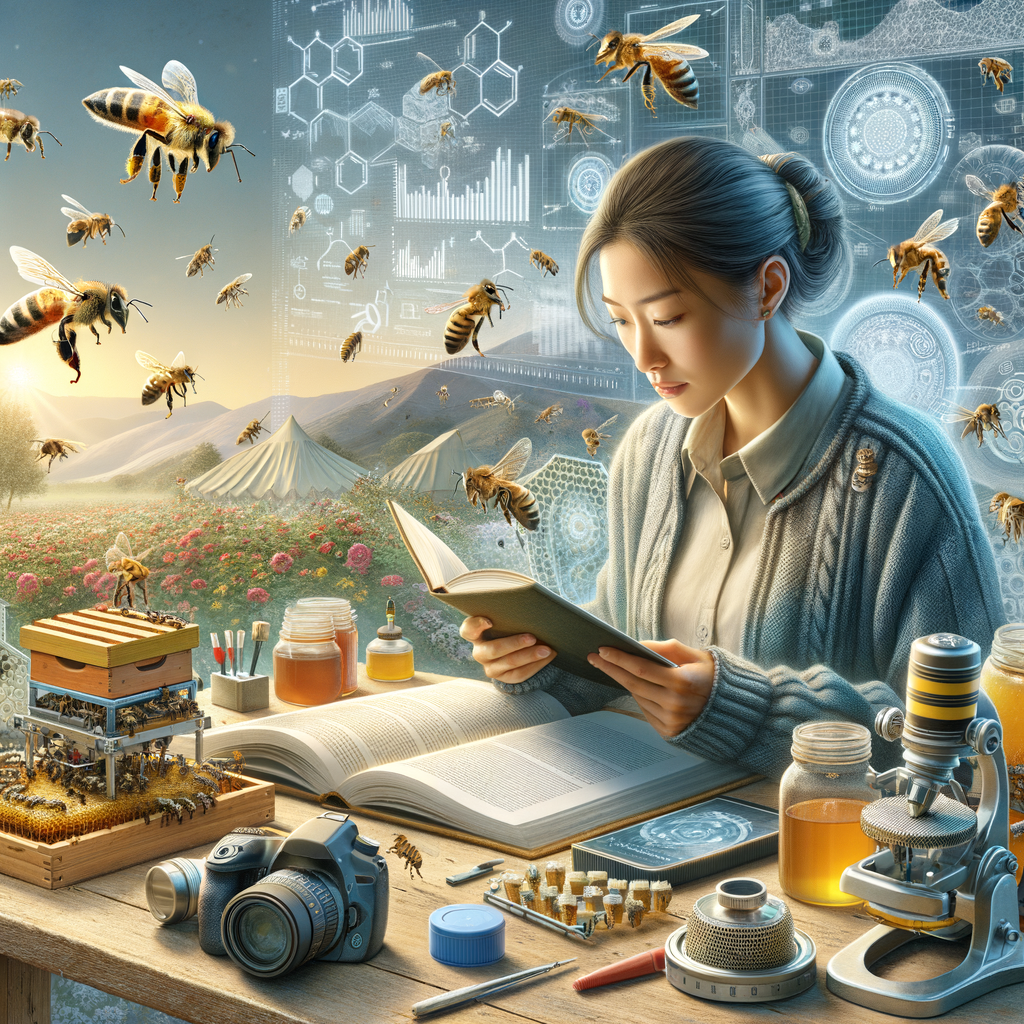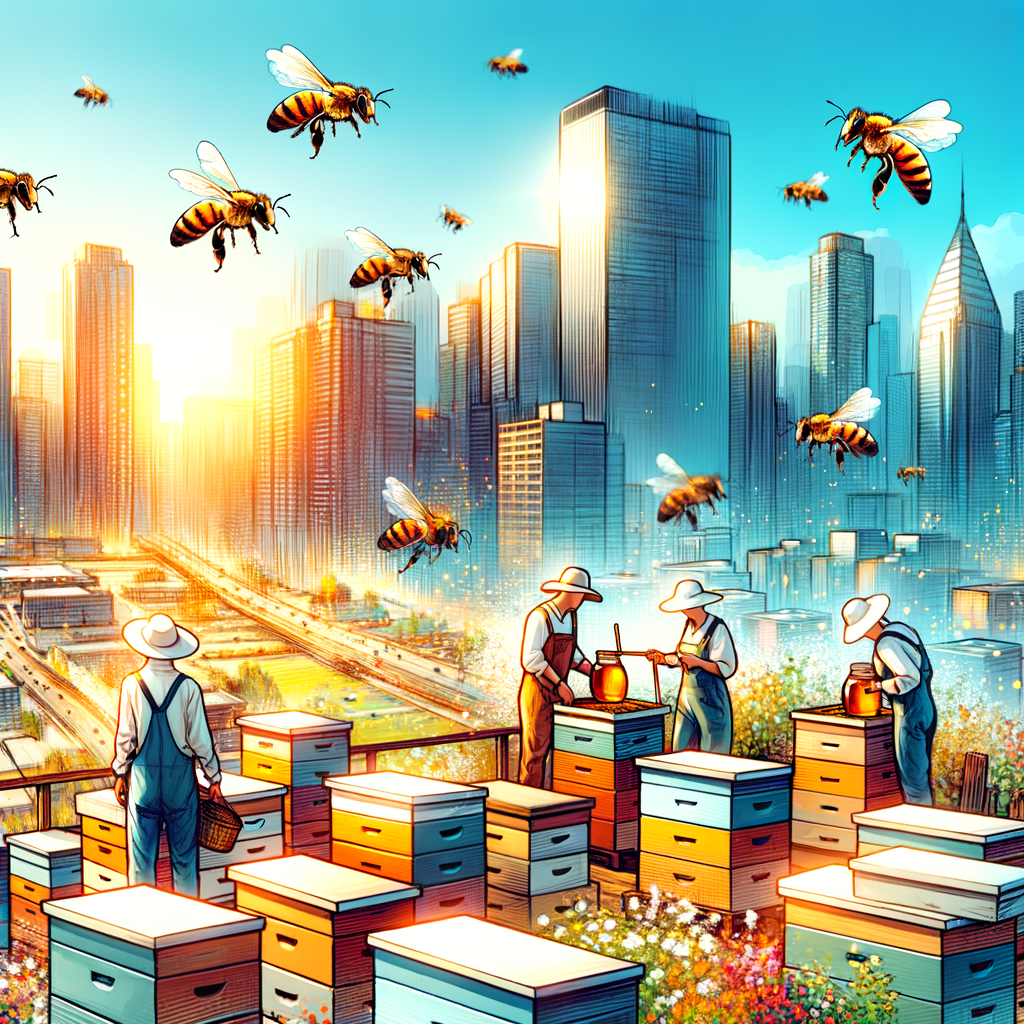
Introduction to Beekeeping Research
Bees play a vital role in our ecosystem. They are the primary pollinators, responsible for the growth of most fruits, vegetables, and nuts we consume daily. However, their population is declining at an alarming rate. This is where beekeeping research steps in, providing valuable insights to help protect and nurture these tiny, hardworking creatures.
-
- The importance of beekeeping research
Beekeeping research is crucial for several reasons. It helps us understand the biology and behavior of bees, their interaction with the environment, and the factors causing their decline. This knowledge is essential to develop effective strategies to protect bees and ensure their survival. For instance, research has shown that certain pesticides are harmful to bees. As a result, many countries have now banned or restricted their use.
Moreover, beekeeping research contributes to the improvement of beekeeping practices, leading to increased honey production and improved pollination. It also aids in the development of treatments for diseases and pests that affect bees.
-
- How modern beekeeping techniques are shaping the industry
Modern beekeeping techniques, backed by research, are transforming the industry. Techniques such as selective breeding, hive management, and disease control are enhancing bee health and productivity.
Selective breeding, for example, allows beekeepers to breed bees that are more resistant to diseases and pests. Hive management techniques, on the other hand, help maintain the optimal conditions for bees to thrive. These include regulating the temperature and humidity of the hive and ensuring adequate food supply.
Furthermore, modern techniques are also focusing on sustainable beekeeping. This involves practices that not only benefit the bees and the beekeepers but also the environment. For instance, some beekeepers are now using hives made from eco-friendly materials.
It is the key to understanding and protecting bees, improving beekeeping practices, and ultimately, securing our food supply. As we continue to advance in this field, we can hope for a brighter future for our buzzing friends and for us.
Latest Beekeeping Studies
In the world of beekeeping, research is always ongoing. Scientists and beekeepers alike are constantly studying bees and their behavior to understand them better and find ways to protect them. Let’s take a look at some of the latest studies in this field.
Recent Developments in Beekeeping Research
There have been some fascinating developments in beekeeping research recently. Two studies, in particular, have caught our attention due to their significant findings.
-
- Study 1: Impact of Climate Change on Honey Bee Populations
Climate change is a global issue that affects all forms of life, including honey bees. A recent study has shown that rising temperatures and unpredictable weather patterns can cause stress to bee colonies, leading to a decrease in their population. This is a worrying trend as bees play a crucial role in our ecosystem.
-
- Study 2: The Role of Bees in Pollination and Food Production
Another important study focused on the role of bees in pollination and food production. Bees are responsible for pollinating about one-third of the food we eat. Without them, our food supply would be severely impacted. This study highlights the importance of protecting our bee populations and the need for sustainable beekeeping practices.
These studies provide valuable insights into the world of bees and the challenges they face. They highlight the importance of ongoing research in this field and the need for everyone to play their part in protecting these vital creatures.
Current Research in Beekeeping
Let’s delve into the latest research findings in the fascinating world of beekeeping. These studies provide us with crucial insights into the challenges bees face and how we can help them thrive.
-
Research on Bee Diseases and Their Prevention
One of the most pressing areas of beekeeping research focuses on bee diseases. Bees, like any other living creatures, can fall ill. These illnesses can have devastating effects on bee colonies and, by extension, our environment and food supply.
Recent studies have been exploring diseases such as Colony Collapse Disorder (CCD) and Varroa mites. CCD is a mysterious condition where worker bees suddenly abandon the hive, leaving the queen and young bees behind. On the other hand, Varroa mites are tiny parasites that attach themselves to bees, weakening them and spreading viruses.
Scientists are working tirelessly to understand these diseases better and find effective prevention methods. They are exploring various approaches, from breeding disease-resistant bees to developing new beekeeping practices that can help keep hives healthy.
-
Studies on the Effects of Pesticides on Bees
Another critical area of research is the impact of pesticides on bees. Pesticides are chemicals used in agriculture to protect crops from pests. However, they can also harm non-target species, including bees.
Research has shown that certain pesticides can have harmful effects on bees, affecting their ability to forage for food, navigate, and reproduce. Some pesticides can even be lethal to bees.
Scientists are studying these effects in detail to inform safer pesticide use and regulations. They are also exploring alternatives to pesticides that can protect crops without harming bees.
These research efforts are crucial for the future of beekeeping and our planet. By understanding the challenges bees face and finding solutions, we can ensure that these vital pollinators continue to thrive.
Modern Beekeeping Techniques
As we delve into the modern world of beekeeping, it’s fascinating to see how technology has revolutionized traditional practices. Let’s explore some of the most significant technological advancements in beekeeping.
Technological Advancements in Beekeeping
Technology has brought about significant changes in beekeeping, making it more efficient and less labor-intensive. Two of the most impactful advancements include the use of drones in monitoring bee colonies and improvements in hive design for optimal bee health.
-
- Use of drones in monitoring bee colonies
Drones, also known as unmanned aerial vehicles (UAVs), have become a game-changer in modern beekeeping. These devices can fly over large areas, capturing high-resolution images and videos of bee colonies. This technology allows beekeepers to monitor the health and productivity of their colonies without disturbing the bees. It’s a non-invasive method that reduces stress on the bees and helps prevent diseases and pests.
-
- Advancements in hive design for optimal bee health
Another significant technological advancement in beekeeping is the development of advanced hive designs. Modern hive designs focus on creating an optimal environment for the bees, promoting their health and productivity. For instance, some hives now come with built-in temperature and humidity sensors. These sensors help beekeepers maintain the perfect conditions inside the hive, ensuring the bees are comfortable and productive.
Technological advancements in beekeeping have made it easier for beekeepers to monitor and maintain their colonies. From drones to advanced hive designs, these innovations are helping to ensure the health and productivity of bees, which is crucial for our ecosystem.
Organic Beekeeping Practices
Organic beekeeping is a method that prioritizes the health and wellbeing of the bees, as well as the purity of the honey they produce. This approach involves using natural, chemical-free methods to manage bee colonies and harvest honey. Let’s delve into the benefits and challenges of organic beekeeping and how to overcome these challenges.
-
- Benefits of Organic Beekeeping
Organic beekeeping offers numerous benefits, both for the bees and the beekeepers. Here are some key advantages:
-
-
- Pure Honey: Organic beekeeping ensures the honey produced is free from harmful chemicals, making it healthier and tastier.
- Healthy Bees: By avoiding synthetic chemicals, bees are less likely to suffer from diseases and parasites. This leads to stronger, more resilient colonies.
- Environmental Impact: Organic beekeeping practices are more sustainable and have less negative impact on the environment.
- Challenges and Solutions in Organic Beekeeping
-
Despite its many benefits, organic beekeeping also presents some challenges. Let’s explore these and discuss potential solutions:
| Challenges | Solutions |
|---|---|
| Disease and Pest Management | Regular hive inspections and natural treatments like essential oils can help manage diseases and pests. |
| Harvesting Honey | Using gentle methods to harvest honey, such as a honey extractor, can minimize stress on the bees. |
| Weather Conditions | Proper hive placement and insulation can protect bees from extreme weather conditions. |
In conclusion, organic beekeeping is a rewarding practice that benefits the bees, the beekeepers, and the environment. By understanding and addressing the challenges, we can ensure the success and sustainability of organic beekeeping.
Beekeeping Information and Knowledge
In this section, we will dive into the fascinating world of bees and their behavior. Understanding bee behavior is crucial for successful beekeeping. Let’s explore two key aspects: communication among bees and their colony organization.
Understanding Bee Behavior
-
- Communication among bees
Bees are social insects that live in colonies. They communicate with each other using a complex system of signals, sounds, and dances. For instance, the famous ‘waggle dance’ is a method used by bees to share the location of food sources with their fellow bees. This dance involves a series of movements in a figure-eight pattern, with the angle and duration of the dance providing specific information about the direction and distance of the food source.
-
- Bee hierarchy and colony organization
Bees live in a highly organized society, with each bee having a specific role to play. The queen bee is the mother of all bees in the colony. She is the only bee that lays eggs and is responsible for the growth of the colony. Worker bees, which are all female, do all the work in the hive. They collect food, feed the young, and protect the hive. Drones, which are male bees, have only one job: to mate with the queen. This strict hierarchy and organization ensure the smooth functioning and survival of the bee colony.
Understanding these behaviors is essential for beekeepers. It helps them manage their hives effectively, ensuring the health and productivity of their bees. So, as you delve into beekeeping, remember to pay close attention to your bees’ behavior. It’s a window into their world!
Importance of Bee Conservation
Bees are more than just the creators of the sweet honey we enjoy. They play a crucial role in our ecosystem and are vital for the survival of many plant species. Let’s delve into the importance of bee conservation.
- The role of bees in biodiversity
Bees are known as nature’s little gardeners. They help plants grow by transferring pollen from the male parts of a flower to the female parts. This process, known as pollination, is crucial for the reproduction of many plants.
Did you know that bees help to pollinate around 70 out of the top 100 food crops we eat? That’s about 90% of the world’s nutrition! Without bees, our diets would be much less diverse and nutritious.
Bees also help to create habitats for other wildlife by pollinating plants that provide food and shelter for various creatures. In short, bees are biodiversity champions!
- Threats to bee populations and conservation efforts
Unfortunately, bee populations are declining at an alarming rate due to various threats. These include habitat loss, climate change, pesticides, and diseases. This decline in bee populations can have a significant impact on our food supply and biodiversity.
But there’s good news! Many people and organizations are working hard to conserve bee populations. They’re creating bee-friendly habitats, reducing the use of harmful pesticides, and raising awareness about the importance of bees.
For example, some farmers are planting wildflowers around their fields to provide bees with food and habitat. Schools are teaching kids about the importance of bees and how to create bee-friendly gardens. And scientists are researching ways to improve bee health and increase their populations.
Remember, every one of us can play a part in bee conservation. Even small actions like planting a variety of flowers in our gardens, avoiding pesticides, and providing water for bees can make a big difference.
It’s crucial that we understand the threats they face and take action to protect them. After all, a world without bees would be a much less colorful and nutritious place!
Beekeeping Updates and Research Findings
As we delve into the world of bees, we come across new findings and updates that help us understand these fascinating creatures better. Let’s explore some of the latest research in honey bee health and diversity.
Latest Findings in Honey Bee Research
Recent studies have shed light on two significant areas impacting honey bees: urban beekeeping and monoculture farming. Let’s take a closer look at these findings.
-
- Impact of Urban Beekeeping on Honey Bee Health
Urban beekeeping has gained popularity in recent years. However, research shows that it can have both positive and negative impacts on honey bee health. On the one hand, urban environments can offer a diverse range of flowers for bees to forage. On the other hand, city pollution and lack of suitable habitats can stress the bees and affect their health. It’s a delicate balance that requires careful management.
-
- Effects of Monoculture Farming on Bee Diversity
Monoculture farming, where a single crop is grown over a large area, can have a detrimental effect on bee diversity. Bees thrive in diverse environments. When they are exposed to a single type of flower, their diet becomes less varied, which can impact their health and survival. Research shows that areas with diverse plant life support a more diverse bee population.
In conclusion, the health and diversity of bees are influenced by various factors, including the environment they live in and the food sources available to them. As we continue to learn more about these incredible creatures, we can better support them and the vital role they play in our ecosystem.
Updates on Beekeeping Practices
As the world of beekeeping continues to evolve, it’s important to stay updated with the latest practices. Let’s dive into some of the new techniques in managing bee colonies and the recent updates in beekeeping regulations and policies.
-
- New Techniques in Managing Bee Colonies
With the advancement in technology and research, beekeepers have been introduced to new techniques for managing their bee colonies. One such technique is the use of thermal cameras. These cameras help beekeepers monitor the temperature of the hive, which is crucial for the survival and productivity of the bees. This technique reduces the need for frequent hive inspections, thus minimizing the stress on the bees.
Another innovative technique is the use of mobile apps designed for beekeepers. These apps provide real-time data about the health and productivity of the hive, helping beekeepers make informed decisions.
-
- Updates on Beekeeping Regulations and Policies
Regulations and policies surrounding beekeeping have also seen some changes recently. For instance, in some regions, beekeepers are now required to register their hives with local authorities. This helps in tracking and managing diseases that could potentially wipe out local bee populations.
Another significant policy update is the restriction on the use of certain pesticides that are harmful to bees. This is a major step towards ensuring the survival and prosperity of our precious pollinators.
Staying updated with these practices not only helps in maintaining healthy bee colonies but also contributes to the global effort of preserving and protecting our bee populations. Remember, every small step counts when it comes to saving our buzzing friends!








